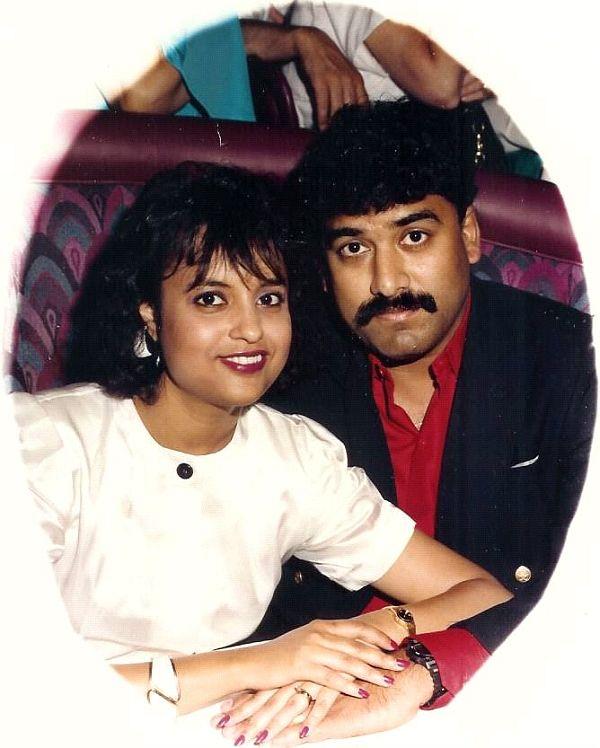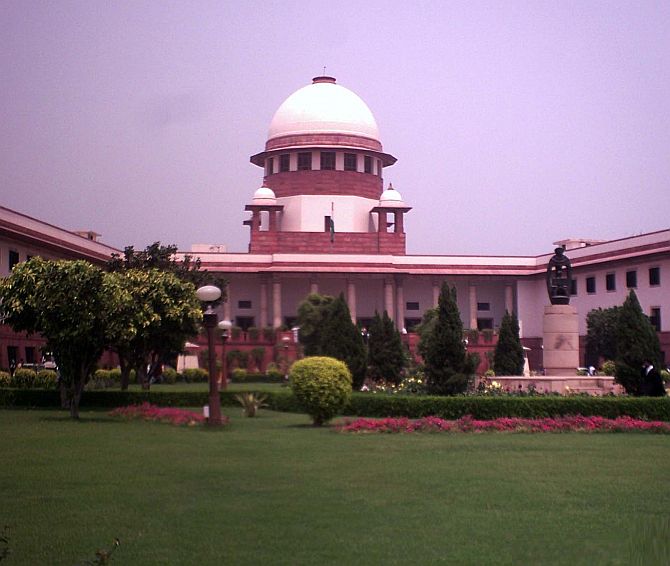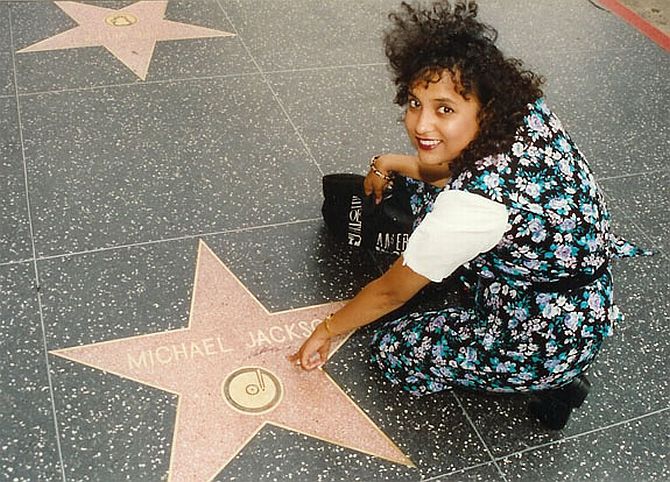Photographs: Dr Kunal Saha Indrani Roy
“The value of human life in India got elevated today,” Dr Kunal Saha told rediff.com over phone from United States soon after the Supreme Court on Thursday awarded a whopping Rs 5.96 crore (Rs 59.6 million) as compensation to be paid by Kolkata-based Advanced Medical and Research Institute Hospital and three doctors to Saha for medical negligence which led to the death of his wife in 1998.
A bench of justices S J Mukhopadhaya and V Gopala Gowda asked the hospital and the three doctors to pay the amount within eight weeks to Saha, an Ohio-based AIDS researcher.
In 2009, the Supreme Court found the AMRI hospital guilty of medical negligence and referred the case to the National Consumer Dispute Redressal Commission, which had fixed the compensation amount to Rs 1.7 crore (Rs 17 million).
The NCDRC had asked three Kolkata doctors and the AMRI to share the compensation amount. Saha, however, claimed that the compensation, along with interest since 1998, should be Rs 200 crore (Rs 2 billion) and moved the Supreme Court.
On Thusday’s judgement, the court said that out of the total compensation amount, Dr Balram Prasad and Dr Sukumar Mukherjee will pay Rs 10 lakh (Rs 1 million) each and Dr Baidyanath Halder will need to pay Rs 500,000 to Saha within eight weeks.
Saha told rediff.com that though his personal fight ended with the Supreme Court verdict, the cause for which he had been fighting all these years assumed a larger dimension.
...
'The compensation is not that big in the US context'
Indrani Roy
“Though in India the verdict is being looked upon as a landmark, mainly because of the compensation it has granted, in the US context (read in dollar terms), the amount is not that huge,” Saha told rediff.com.
“However, the legal battle that had ensued following my wife’s death was a fight against injustice and I am happy that it’s the truth that won in the final lap,” he added.
“It should also be mentioned that the money that I got covers only a fraction of the amount I had spent in courts,” said Saha.
“I will use up a part of it to foot the lawyers’ bills while the rest of the amount I will send to People for Better Treatment, an organisation that I set up in 2001.
The main aim of PBT India is to eradicate medical negligence and promote corruption-free healthcare in India. PBT India was inaugurated on December, 30, 2001 at the Netaji Subash Institute, Sealdah by Saha. The latter is PBT’s founding president.
...
What had happened to Anuradha Saha?
Indrani Roy
Anuradha Saha, 36, a recent graduate in child psychology from Columbia University, New York came to Kolkata with her husband for her brother's wedding in April 1998.
After a few days in Kolkata, she developed a cold, fever and skin rash. On April 19, it didn't look too serious. However, after a week, the skin rash worsened and the family fixed up an appointment with Sukumar Mukherjee, who was apparently ‘the best doctor’ in town.
Mukherjee prescribed high dose of steroids as treatment. The skin rash was later diagnosed as Toxic Epidermal Necrolysis, an immune disorder.
By May 4, Anuradha's condition deteriorated. Saha, who was a researcher and did not practice medicine, was not conversant with rashes but he did question the use of steroids that Mukherjee insisted on.
Over the next five days, 800 mg of Depomedrol was given to Anuradha.
(Months later, in correspondence with Pharmacia-UpJohn in the US, the makers of the steroids, Saha would learn that the correct dosage was 40 to 120 milligrams once every two to four weeks.)
While under Mukherjee’s ‘treatment’, Anuradha’s skin came out and she was admitted to the Advanced Medical Research Institute. Instead of using the accepted protocol used with TEN patients, the doctors and the hospital staff did not suggest a sterile environment and advised against giving Anuradha intravenous fluids, an important requirement as skin loss often leads to serious dehydration.
Anuradha was made to drink the ‘necessary’ fluids, though her mouth was swollen and full of sores. She swallowed one-two litres of fluids as the doctors suggested when four-seven litres are usually prescribed in such cases.
Afterwards, the doctors prescribed more steroids, 120 mg per day of oral prednisolone.
They also advised against any dressings for the skin, which soon got infected.
By May 16, Anuradha was more dead than alive.
...
What had happened to Anuradha Saha?
Indrani Roy
In a final desperate attempt to save his wife, Saha moved her to a Mumbai hospital in a chartered plane.
On May 28, Anuradha died.
The cause of death was listed as septic shock with systemic candidiasis, a frequent side-effect of excessive steroids. Since then, Saha has been in and out of courts and his long struggle ended on Thursday. With an additional 6 per cent interest approved by the court, the final amount of compensation decided by the court stands at Rs 14 crore (Rs 140 million) approximately.
“Anuradha had always been my pillar of strength, the pivot of my life,” Saha told rediff.com, his voice choking with emotion.
“As I watched her pass away in the Mumbai hospital, I could hear a voice telling me, ‘This was meant to be. I came into your life for a purpose. My dying, too, has a purpose.
It is up to you to stand up and raise your voice so that the thousands who are dying in our motherland may be saved’.”
“It could have been a hallucination or a kind of fiery passion that expressed itself in such a weird manner,” Saha said.
...
'Good doctors should kick out the rotten apples'
Indrani Roy
According to Saha, through this verdict, the Supreme Court sent out a categorical message to Indians: “One should never give up hope during a crusade of this stature. I walked a long legal path during these 15 never-ending years. It was not a cakewalk for me and on many occasions, I felt tired, hopeless and frustrated.”
“However, I hung on to the case for my dear life and it ultimately paid off,” Saha said.
“I am very happy that the Supreme Court has upheld justice and truth. The verdict is a kind of warning for those doctors who think medical practice is a business wherein humans are treated like pawns.”
“The court cautioned the doctors that patients cannot and should not be tossed around to serve a handful of people’s vested interests. The Supreme Court’s stand is sure to affect those doctors who don’t care for their patients at all as long as their pockets are laden with cash,” he added.
Saha, though, still believes that there are many ‘good’ doctors around.
“The onus rests on them to kick the rotten apples like Dr Sukumar Mukherjee out. It is they who can be the torchbearers of the movement that I initiated through People for Better Treatment,” Saha said.
Saha believes if doctors around the world gear up to fight corruption and mis-treatment, healthcare system as a whole will stand on its head and people’s trust in medical services will be reinstated.
...
'Healthcare has become a business'
Indrani Roy
Saha feels that the root cause of the problem lies in the education system as it exists today.
“Now, it is money, not merit, that decides a candidate’s future,” Saha said, adding, “When we were students, we became doctors purely on the basis of our merits. But now, a career in health can be bought and sold. This is not only unfair but unethical. For, it corrodes the system from its very foundation.”
Saha thinks that health service across the world, and more so in India, has become a business in which doctors eye their patients as ‘money-spewing machines’.
“Unless this attitude changes, no movement, however big, can ever be successful. Healthcare facilities across India need to be improved on a war footing. As for West Bengal, the entire structure is in a shambles,” he said, adding that “the state governments, be it the erstwhile Left Front or the present Trinamool Congress, did nothing to better the situation.”
Incidentally, Saha has been dealing with a number of legal cases against West Bengal’s medical council right from the time the Left Front ruled the state.
“It pains me to think that Dr Sukumar Mukherjee is Bengal Chief Minister Mamata Banerjee’s chief medical adviser,” Saha said.
In this context, Saha mentioned about US President Barack Obama’s healthcare law that kicked up a colossal controversy in the country, leading to a long shutdown by the US government.
Saha said, “Though politicians cooked up a huge row out of it, I fully support what Obama plans to do. It’s a beneficial scheme that he has in mind and it should not be thwarted. Healthcare should be a right and not a privilege. It’s time lawmakers across the world realised that.”
(It should be mentioned here that the Tea Party, strongly opposed to the US Administration’s new healthcare initiative, recently held legislative approval of the budget hostage to its demand that the healthcare law be repealed.)
...
'Anuradha taught us how important life is'
Indrani Roy
Meanwhile, the staff of People for Better Treatment in Kolkata was a happy lot on Thursday. The office telephone never stopped ringing ever since the Supreme Court announced its verdict.
“It’s a victory of the people’s rights,” Ratna Ghosh, assistant secretary, PBT, told rediff.com.
“It had been a long legal haul for all of us here, especially for Dr Saha,” she said,
“But though patience was bitter, its fruit has more than satisfied us.”
The way ahead seems a long and a tough one, Ghosh ardently believes that this verdict will give the movement its much needed impetus.
“It will not only inspire us to tread the difficult path with renewed confidence but will also instil hope in the minds of thousands of patients and their kin who come to us seeking justice against medical negligence.
“Indeed, through her death, Anuradha taught us how important life is,” Ghosh signed off.








article